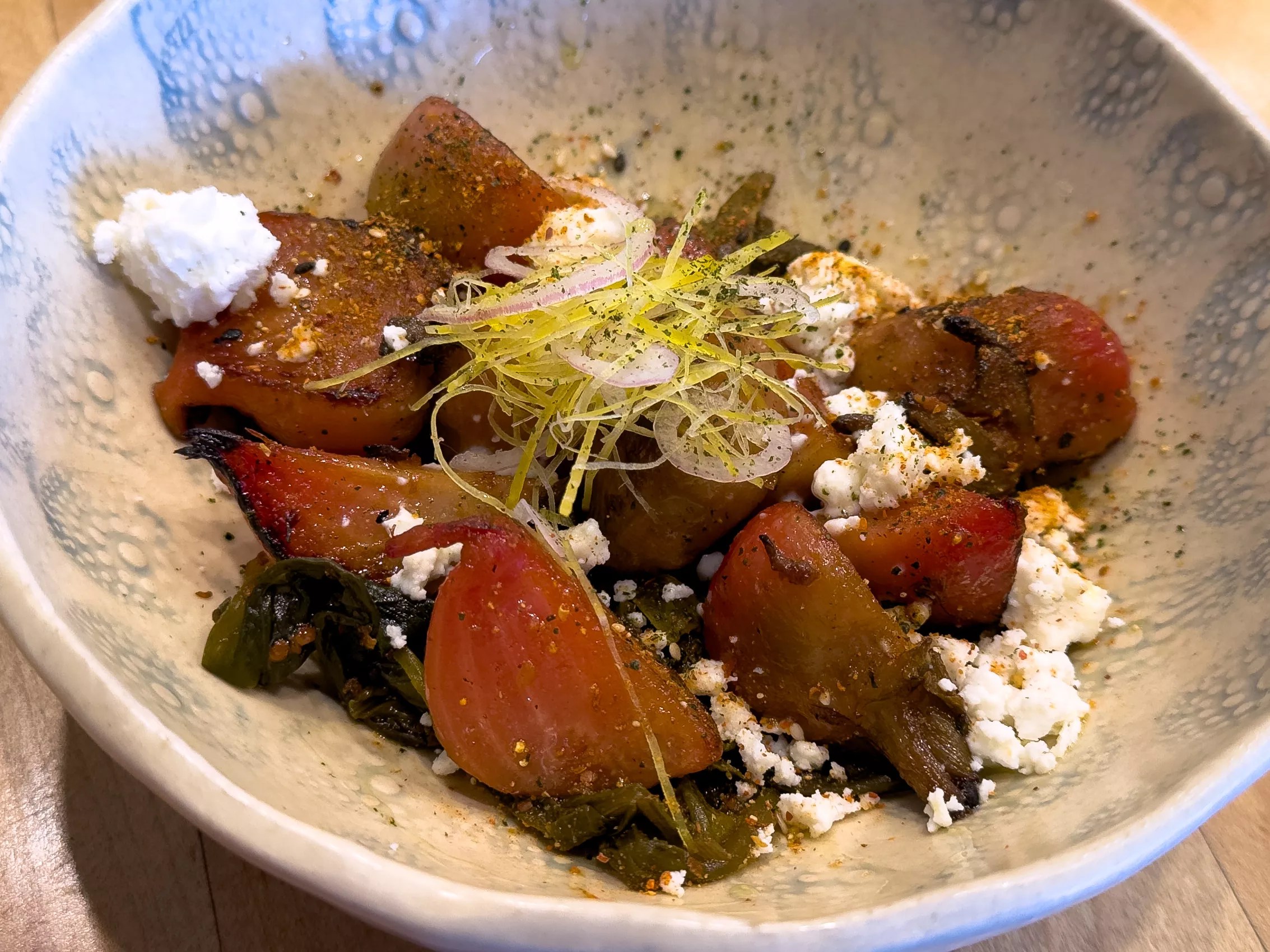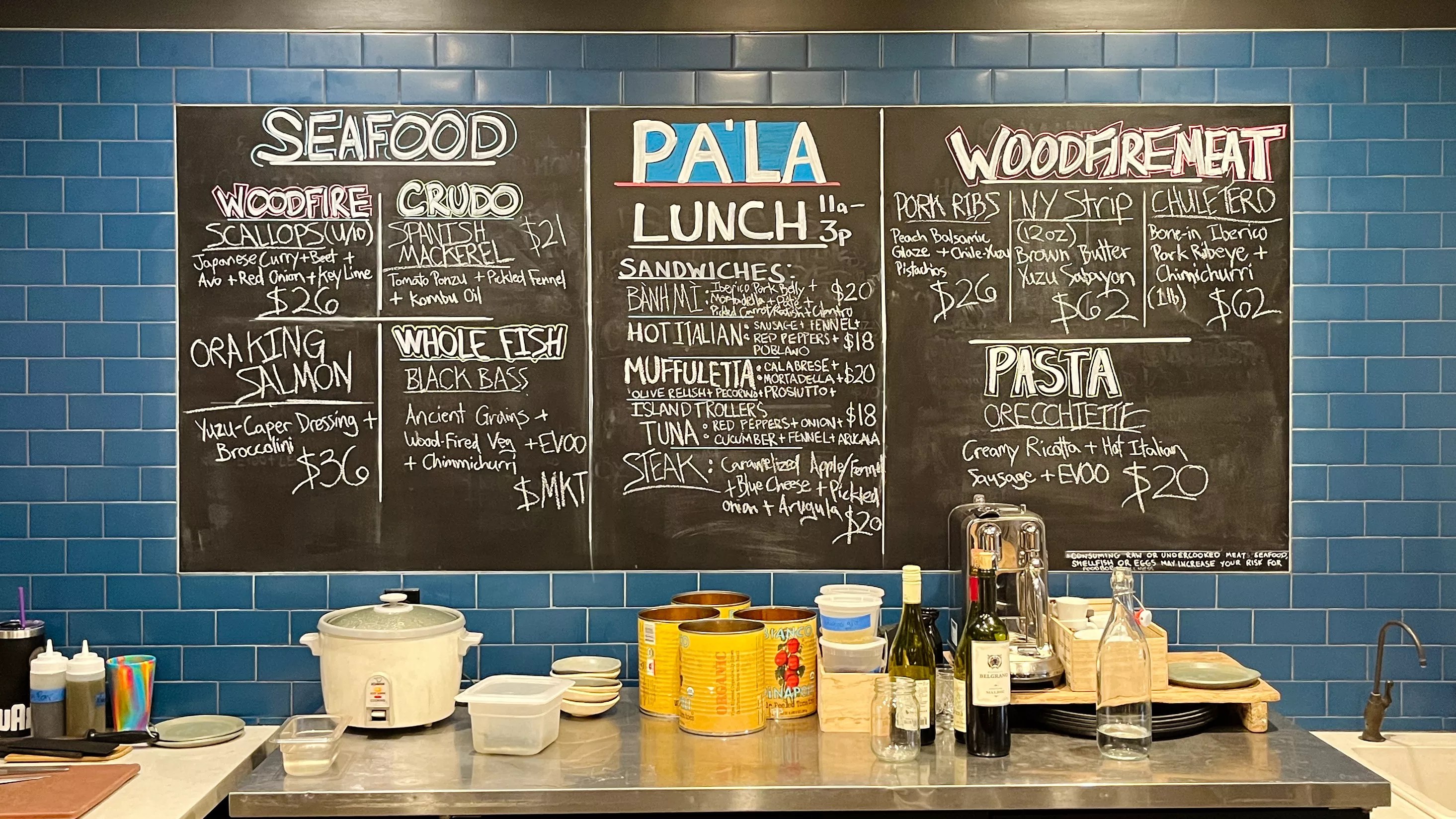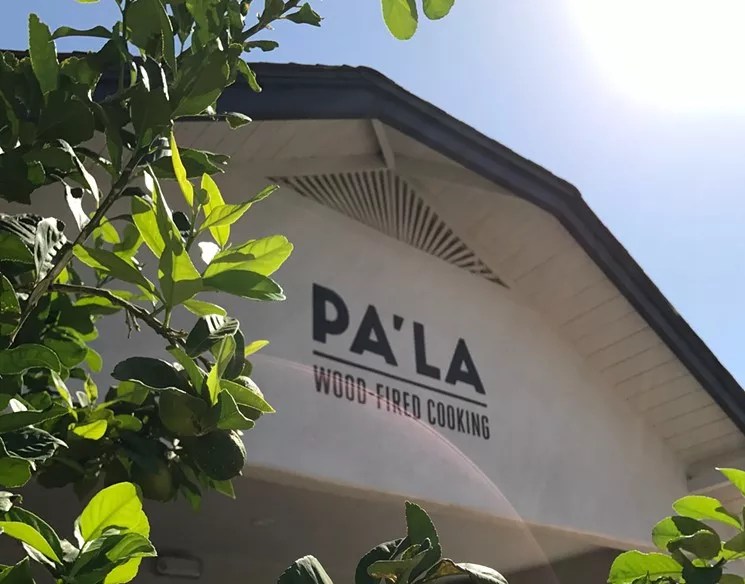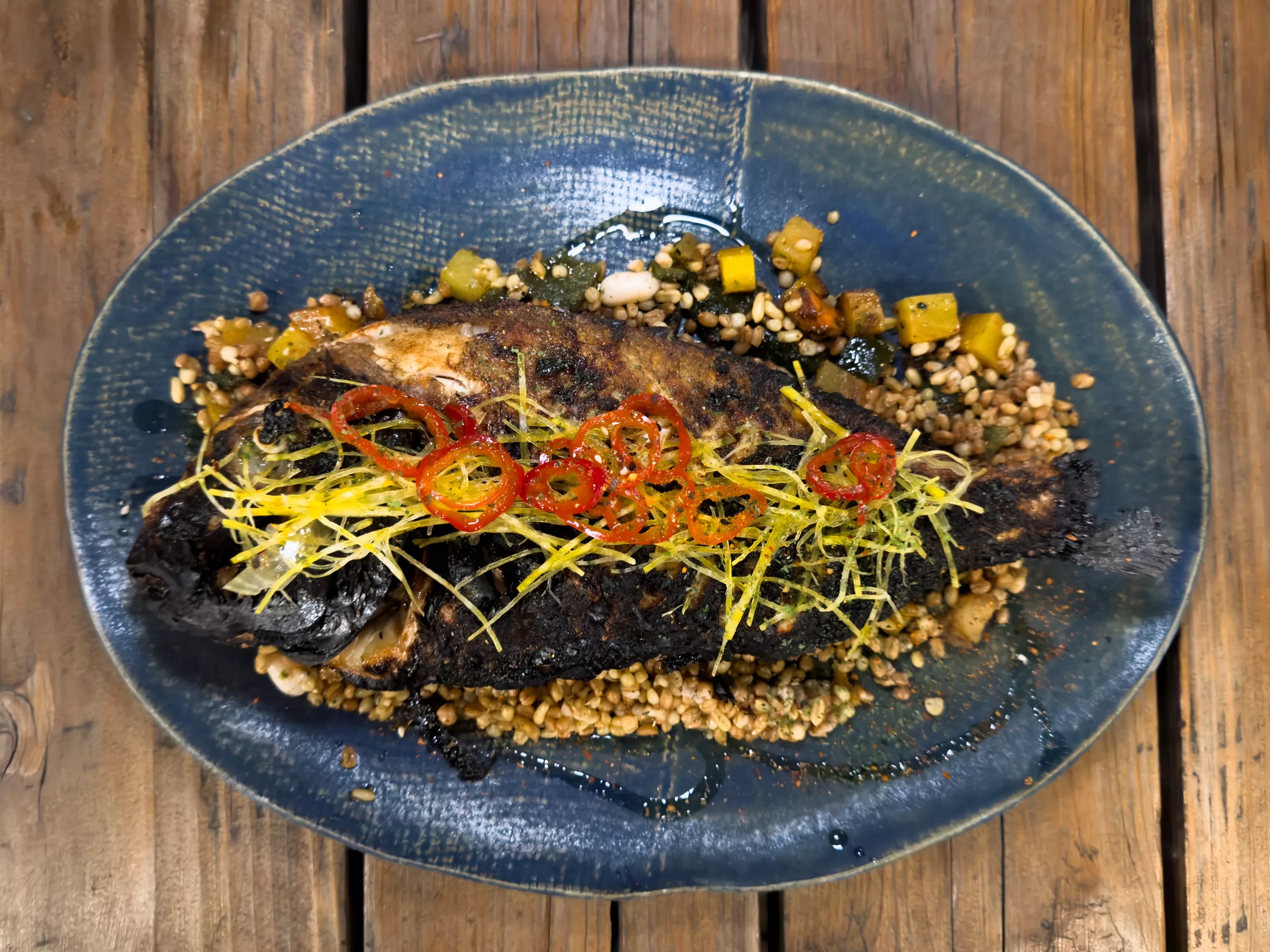
Dominic Armato

Audio By Carbonatix
Everyone’s a little raw about the cost of dining out right now.
The $10 lunch is ancient history, the $250+ tasting dinner is back, and everything in between is taking a bigger bite than it did a few years ago.
Diners are displeased, and though their frustrations are often misplaced, they’re understandable. Dining in America has long been a story of artificially low prices subsidized by the exploitation of somebody (probably a lot of somebodies) in the supply chain. The economic pressures of the pandemic burst the dam, forcing a long-overdue correction that may have eased the pressure on some restaurants but also pushed customers into a state of sticker shock.
Whether this inspires a capitalistic race to the bottom or a wholesale revolution in restaurant and dining culture remains to be seen. But for eateries like Pa’La, which launched in 2017 with a mission to make fine food affordable to more people, it’s time to adapt or die.
As a result, Pa’La 2023 looks a lot different than Pa’La 2017. But the ways it has evolved over the past six years are fascinating, instructive and – thankfully – still delicious.

Pa’La on 24th Street has moved to a more traditional restaurant format with paper menus, but the charming chalkboard remains.
Dominic Armato
Times (and prices) change
Before the second location opened in 2021 with two stories, full service, a lengthy menu and upstairs lounge in downtown Phoenix, Pa’La existed solely as a quaint little restaurant on an unassuming stretch of 24th Street.
The downtown location is an excellent restaurant in its own right, but it doesn’t have a fraction of the charm of its older sibling.
The whitewashed bungalow with bright blue trim sits nestled off 24th Street behind a small orchard of citrus trees and succulents, hiding a cozy room with hardwood floors, knitted throw pillows and an open, wood-fired kitchen. A wooden porch that takes up nearly half the lot is a beautiful setting when the weather is nice, its tables sitting in dappled shade by day and the faint glow of twinkle lights by night.
Here, Claudio Urciuoli – perhaps the most overqualified chef ever to serve $11 entrees – held court for five years, chatting at the counter while baking fresh bread to order, slinging skate and sausage and any premium protein he could procure splashed with imported olive oils and vinegars on sturdy paper plates with compostable utensils. It was an unconventional and oft-misunderstood approach laser-focused on convincing a skeptical public that a carefully crafted sandwich built with premium ingredients at $11 was both a better deal and better for you than a burger and fries at $8.
But what happens when that $11 sandwich costs $13 to produce? Or $16? Or $20?
Today, under chef Jason Alford, the original Pa’La is a different restaurant with a similar – if modified – ethos. But to understand the trajectory of Pa’La’s philosophy, it’s instructive to go back to the Source.

Pa’La underwent a seamless transition between chef Claudio Urciuoli and its new team.
Claudio Urciuoli
Sourcing value
Urciuoli left Pa’La in mid-2022, and by Christmas, he had launched Source, a new restaurant very similar to the original Pa’La, at Agritopia in Gilbert.
The dishes at Source are stunning – a reminder of what a meal at Pa’La used to be, retooled in a way to keep the old price points viable.
Urciuoli’s red lentil croqueta sandwich is folded into delicate, steaming flatbread that’s baked to order, glistening with premium olive oil and dusted with a bracing dash of za’atar. Enrobed in cool lemon labneh and thinly shaved cabbage slaw, the croquetas are steaming hot and tender with a crisp shell and an earthy spice.
At the risk of channeling a clickbait headline, the chopped salad will shock and amaze you. It looks awfully pedestrian – mixed lettuce with diced vegetables and beans, a little meat, a little cheese, a cabernet vinaigrette and a light dusting of breadcrumbs. But perfect execution and flawless balance turn this plain-faced salad bowl into something exquisite: A bright and vibrant medley that dances with flavors and textures, wild and ebullient in a way you wouldn’t have thought a green salad could be.
And the house pizza punches far above its weight class because it’s an exercise in careful sourcing. A blend of imported and domestic premium flours, Bianco di Napoli tomatoes and di Stefano mozzarella from California, Decimi extra virgin olive oil from Umbria and wild mountain oregano from Controne – they all come together and shine with the brilliance of the summer sun when prepared by a skilled hand.
The sandwich is $13. The salad is $12. The pizza is only $11. And Urciuoli can do this because rather than leaning on fresh meat and seafood, he has switched his focus to grains and vegetables that are inherently low cost. The wholesale price of $4 per pound might be expensive for lentils, but relatively speaking, lentils are cheap. And $4 is all it takes to get you some of the best lentils in Italy. Through adjustments like these, he’s managed to continue serving stellar dishes at low prices.
“That’s my principle,” Urciuoli says. “I don’t believe in expensive food.”

The whole roasted fish at Pa’La is a showstopper, seasoned and charred to black and served on a bed of ancient grains and roasted vegetables.
Dominic Armato
Pa’La takes a different track
Back at Pa’La, Alford responded to rising costs a different way: by taking the menu format in new directions.
If you missed the transition from the Urciuoli to the Alford era, you’re not alone. The two overlapped and dovetailed so well stylistically that the change was almost seamless, in no small part because Alford was always a fan of Urciuoli’s work.
“I loved going to Pa’La. I get what’s inside that paper bowl, and [it was] a great price,” Alford explains. “But that was 2018, 2019. We’re in a different world since 2020.”
With Pa’La Downtown growing in popularity, Alford and owner Omar Alvarez didn’t want to drop the premium meats and seafood at Pa’La 24th Street for fear of bifurcating their theme. And with prices rising out of necessity, patrons increasingly bristled at upscale dishes served on paper plates.
So Pa’La 24th Street retooled itself as a chill, neighborhood version of Pa’La Downtown, adding plates and flatware, full service, printed menus and the talents of chef Nick Bennett, brought on to oversee the kitchen and collaborate with Alford on the menu’s design. The result is one of the most delicious neighborhood restaurants in town.

Though it’s a simple appetizer, slabs of grilled Japanese sweet potato topped with a dollop of a house-made Aleppo chile crisp might be Pa’La’s best foot forward.
Dominic Armato
Achieving casual elegance
Pa’La maintains its tapas-style roots, making a nibble of olives and spiced Marcona almonds or a plate of pickled anchovies and crackers almost mandatory.
Small plates skew vegetarian, and thick slabs of grilled Japanese sweet potato anointed with a house-made Aleppo pepper chile crisp might be the kitchen’s best foot forward, pairing an aggressive char with the chile’s sweet, earthy tones. Meanwhile, roasted Chioggia beets served with mild feta rest upon their own greens, fermented to a sharp pickled funk reminiscent of kimchi.
Seafood still figures prominently. The crudo selection cycles quickly, but a recent offering of pink snapper with barrel-aged shoyu and fennel two ways – a roasted puree and a bright pickle – hit a crowd-pleasing naturally sweet and sour note. More esoteric were thick slices of Spanish mackerel, their natural sultry umami bolstered by tomato ponzu and a rich kombu oil that brought out the fish’s more complex notes.
“Large” plates can be massive, such as a stellar whole snapper, wood-roasted until its seasoned rub is blackened and set on a bed of chewy ancient grains and diced vegetables. Unsauced fish is a tough sell in this town, but the flesh is so delicate and sweet and the charred rub so intense that it wants for nothing.
And the chuletero – a hefty 1-pound bone-in Iberico pork ribeye shipped in from Spain – boasts a natural flavor so succulent and robust it’s hard to believe this is the same animal sold as pork in the U.S. It’s prepared like a rare steak, seasoned and grilled over hot embers to a juicy sizzling crisp, still cool and ruby red at its core. It’s not undercooked – that color is by design. This pig doesn’t play by our rules, and the kitchen, to its credit, trusts that Phoenix diners will appreciate it on its own terms. Please show them that trust isn’t misplaced.
A weakness, ironically, is some of the old Pa’La classics. Roasted, charred polenta cakes topped with ruddy Bianco di Napoli tomatoes remain an underappreciated scene-stealer. But the lunchtime pita sandwiches, still quite good, aren’t as light on their feet as they were under Urciuoli’s watch. And the famous Navarro bowl may be named after a surfer, but that doesn’t mean the ancient grains within should be swimming. (Easy on the vinaigrette there, fellas.)

Rings of delicata squash, roasted in Pa’La’s wood-fired oven, are paired with crumbled sheep’s milk feta and dressed with maple brown butter.
Dominic Armato
Value fine dining
It’s no surprise that Alford, once executive chef of the swanky (and expensive) Roka Akor, has carried through Urciuoli’s commitment to top-notch sourcing. But $20 sandwiches and $60 imported pork steaks, while a good value considering their quality, are hardly the $9 pizzas and sandwiches of Pa’La’s early days.
Instead, Alford has snuck in his own version of democratized fine food in the form of two special weekly dinners: a six-course vegetarian omakase for $65 and an eight-course community dinner for $85, the latter including wine.
Alford says that a vegetable-focused omakase was a nod to his clientele’s wishes but also a way to keep the menu affordable.
I’ve sampled wood-roasted cauliflower dressed with sweet Japanese curry vinaigrette, melting into a cool puddle of herbed ricotta. Rings of delicata squash cavort with crumbles of tart sheep’s milk cheese, both bathed in a sweet and nutty maple brown butter. Purple Peruvian potatoes smeared with a shio koji umami bomb take on a smooth, creamy texture that almost smacks of rich, fatty p’té. And a yuzu semifreddo cake topped with raspberry and rooted in thick pistachio butter is simple, elegant and impressive.
But Pa’La saves its best value for Tuesday night’s communal dinner – a format so well received that it’s recently come to the downtown location as well.

Tuesday night communal dinners at Pa’La on 24th Street are not only a sociable night out but they also happen to be one of the best fine dining deals in town.
Dominic Armato
Find a seat at the community table
Alford wasn’t gunning for cheap fine dining. His thought, in the wake of the 2020 restaurant apocalypse, was to offer a casual community table on a quiet weeknight where folks could share some good food and wine and shake off the antisocial fog of the pandemic doldrums. He’s certainly done that, and Pa’La’s porch is an ideal home.
But in conceiving the communal dinner, Alford has inadvertently created a sort of casual fine dining experience that includes some expertly crafted cuisine at a price point far lower than similar tasting menus around town.
Dinner starts with little fanfare, the chef doesn’t have a scripted spiel for every course, and the wine – one white, one red – sits on the table for you and your neighbors to pour whenever you please. Hardly a fancy-pants production, it plays like a dinner party where the informal presentation is what makes the price point viable.
The food, however, is anything but casual. Disarmingly plated family-style, to be shared with your neighbors, Alford and Bennett’s community menu mirrors the sophistication of Pa’La’s regular menu. Gargantuan, plump langoustine arrive as a crudo, a loose nori hand roll filled with sushi rice and dressed with shoyu. Buttery, thick scallops – expertly seared – grace a golden beet puree with hints of curry and lime.
Rings of fresh squid in parsley sauce are a bit of a misfire, arriving tougher than they should be. But roasted turbot served in the same style as the snapper is almost worth the price of admission alone, a gleaming piscine specimen roasted to a deep golden hue, meltingly tender in spots and bracingly crisp in others.
By the time the Iberico pork arrives – a New York cut this time – not only can’t my newfound compatriots believe it isn’t beef, but they’re so well fed that we spend the next 15 minutes offering the last few slabs to each other.
Everyone gets their own dessert, which is wise because the crowd is well sauced at this point and someone’s bound to lose a digit in the scrum. But in the afterglow of a fine meal and a couple glasses of wine, I can’t help but appreciate that Pa’La, though very different from the restaurant that blew my mind in 2017, has managed to maintain both its mission and its integrity through a chef change, a pandemic and a conceptual makeover.
No one wants to be forced to adapt. But sometimes good things happen when we do.
Pa’La 24th Street
2107 N. 24th St.
602-795-9500
11 a.m.-3 p.m. and 6-10 p.m. Tuesday through Saturday; 5-9 p.m. Sunday.
Tapas $7-$20; Vegetables $10-$12; Sandwiches $18-$20; Large plates $20-$62; Tuesday Community Dinner $85; Wednesday Vegetarian Omakase $65.